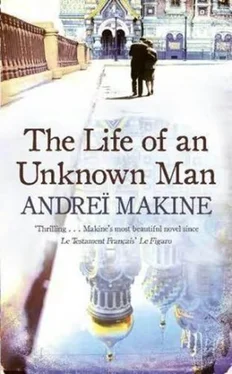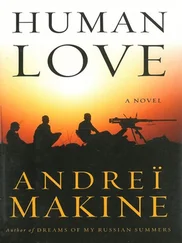Andreï Makine - The Life of an Unknown Man
Здесь есть возможность читать онлайн «Andreï Makine - The Life of an Unknown Man» весь текст электронной книги совершенно бесплатно (целиком полную версию без сокращений). В некоторых случаях можно слушать аудио, скачать через торрент в формате fb2 и присутствует краткое содержание. Жанр: Современная проза, на английском языке. Описание произведения, (предисловие) а так же отзывы посетителей доступны на портале библиотеки ЛибКат.
- Название:The Life of an Unknown Man
- Автор:
- Жанр:
- Год:неизвестен
- ISBN:нет данных
- Рейтинг книги:3 / 5. Голосов: 1
-
Избранное:Добавить в избранное
- Отзывы:
-
Ваша оценка:
- 60
- 1
- 2
- 3
- 4
- 5
The Life of an Unknown Man: краткое содержание, описание и аннотация
Предлагаем к чтению аннотацию, описание, краткое содержание или предисловие (зависит от того, что написал сам автор книги «The Life of an Unknown Man»). Если вы не нашли необходимую информацию о книге — напишите в комментариях, мы постараемся отыскать её.
The Life of an Unknown Man — читать онлайн бесплатно полную книгу (весь текст) целиком
Ниже представлен текст книги, разбитый по страницам. Система сохранения места последней прочитанной страницы, позволяет с удобством читать онлайн бесплатно книгу «The Life of an Unknown Man», без необходимости каждый раз заново искать на чём Вы остановились. Поставьте закладку, и сможете в любой момент перейти на страницу, на которой закончили чтение.
Интервал:
Закладка:
Each title includes a woman’s name: Tatyana, or the Fire Tamer; Deborah and the Chemistry of Pleasure; Bella, a Woman with No Taboos… Vlad is showing Shutov the new series launched by his publishing house. They lifted the idea from Nabokov’s Ada, or Ardor, he concedes. But Nabokov himself borrowed it from women’s romantic fiction… The young man talks a language Shutov has never heard in Russia. “Market analysis,” “book promotion,” “boosting sales”… For the new series what they needed was a clear definition of the “generational niche,” which, happily, is quite broad: female readers between the ages of thirty and fifty who are “not very intellectual” (coming from Vlad, this is a compliment) and a small minority of men who “have a bit of a problem with sex” and will read these books on the quiet.
Seeing Shutov’s perplexed expression, Vlad hastens to add, “Fine, we also have more serious brands!” and he mentions various series of historical novels, family sagas, political fiction… But it is the word “brand” that disconcerts Shutov. Vlad translates: “They’re… how do you say it in Russian? Well… Yes. Makes, labels. You see, all these Bellas and Tatyanas, we have to bring them out at regular intervals. That’s how you create reading habits, you know, get people addicted. The problem is that each of these books runs to five hundred pages. No writer can keep pace with that. Unless he’s what my grandfather used to call a Stakhanovite. And so, several of them write under one name, preferably an American one. That’s a brand…”
Vlad notices that this explanation plunges Shutov even deeper in thought. He leans over, picks up several volumes that are lying there on the wall-to-wall carpet. “Look, there’s some heavyweight stuff as well.” Shutov scans the titles. Secrets of the Kremlin; Stalin, Between God and the Devil; Nicholas II, the Innocence of a Martyr…
“Are you sure he was really innocent?” asks Shutov, trying to rouse himself from his bemusement.
“Of course. They’ve just made him a saint!”
“For having led Russia into revolution…”
“No, hold on. The revolution was a plot hatched abroad. Look, this book here is quite categorical about it…”
Menacing shadows on a bloodred cover. The Occult Forces Behind the Revolution. Shutov smiles.
“Ouch! That’s scary!”
“That’s the idea. And you should have seen the ad I put together for the launch. There was this Russian monk praying in front of an icon with a crowd of devils dancing all around him…”
“That’s not very close to the historical truth. Especially if your monk looked like Rasputin.”
“Historians rewrite the truth every day. What interests us is the truth that gets the reader to reach for his wallet. You know what my boss’s motto is? ‘Only the blind are excused from buying our books.’ And it’s more or less the case. But you need imagination for it. When we were launching the book on Stalin I dug up a cleaning woman who’d worked at his dacha on the Black Sea. Imagine that! She’s a granny aged a hundred now, but I still managed to get her on TV and the interviewer (well, he’s one of our authors) questioned her in such a way that you might have thought she’d been Stalin’s mistress. The next day we’d sold out. That’s historical truth. Or take Bella, with No Taboos. It’s about a brothel where the Moscow underworld go. Well, to launch it on TV we had five prostitutes who swore everything in the book was true…”
Vlad gets carried away, soon Shutov has not enough arms to hold the rolls of posters, the large-format photographs; Nicholas II adorned with the halo of a newly canonized saint; Stalin with a female figure in the background and a gangster thrusting open the collar of a blouse with the barrel of his revolver to reveal enormous, very pink breasts.
“The same carnival yet again,” thinks Shutov, violently struck once more by the heady intoxication of the change. What energy this young Vlad has! And this easygoing cynicism, selling books like vacuum cleaners. All these publishing houses have sprung up in just a few years! And already they have this American-style know-how…
Suddenly, in the armful of documents, Shutov catches sight of a view of a park, with sculptures beneath autumnal foliage. The Summer Garden… The picture vanishes beneath a swatch of color photographs: women embracing, men exchanging tender kisses…
“That’s our series aimed at sexual minorities,” comments Vlad. “I told you. No one escapes us!” He laughs.
Shutov remembers the carnival executioners who cut off his head earlier: that’s it, no one is to look sad. The parallel is disturbing.
“You know, Vlad, in the old days, when I was young, a good many poets were published. The print runs for their books were not vast but there was… How can I put it?… Yes, there was real passion in those of us who read them. Often printed on very poor paper. Poetry was our bible…”
“Yeah. I can see what kind of books you’re talking about. The old folks heave a sigh and call it ‘Great Literature.’ Listen, I’ll tell you what I think about it. I once met a girl, an American, in the same job as me. And she started giving me a lot of stuff, like: oh sure, we publish crap but that’s so we can publish Real Literature! What two-faced bastards these puritans are! Well, I wanted to put her on the spot so I quoted Marx: the only criterion of truth is the practical result. And in publishing the result is the number of sales, OK? If crap books sell it’s because they’re needed. You should have seen her face!”
He roars with laughter then, glancing at the television, declares, “But the main thing is, if I published your poets with their small print runs, I’d never be able to afford wheels like that.”
On the screen (the sound is off) the car races up toward the sunrise. “To be on time, when every second counts!” Vlad’s cell phone emits jazz notes and the conversation breaks into slangy English, incomprehensible to Shutov. Vlad covers the telephone with his hand, winks at Shutov, and whispers: “Only joking!…” Yes, only a joke, that remark about the car, thinks Shutov, as he puts aside the rafts of photographs piled up in his lap. A joke, s hutka , the same root as his name…
Behind the door where the mute old man lodges, the chink of a spoon against a cup can be heard.
Shutov makes his way back to his room, his halting steps keeping pace with the arguments that jostle one another in his head. Wisdom after the event… He should have told Vlad that in the old days a collection of poems could change your life, but a single poem could also cost the life of its author. Lines of verse carried the weight of long sentences north of the Arctic Circle where so many poets died…
He imagines Vlad’s mocking reply: “And you think that was good?” There it is. A naive question like this is hard to counter. Why should the Gulag be a criterion of good literature? And suffering a measure of authenticity? But, above all, who can judge the value of lives, of books? In what way can Vlad’s existence be said to be less meaningful than that of some poor bastard using his last few kopecks to buy a pamphlet by a banned poet printed on wrapping paper? To these young Russians no book is forbidden now. They travel the world (Vlad has just come back from Boston), they are well fed, well educated, free of complexes… And yet they lack something…
Shutov is trying not to think like a petty, embittered old man. No, Vlad has no reason to be jealous of that Soviet youth of thirty years ago. They had nothing to set him dreaming. Nothing. Except, perhaps, a volume of poems with grayish pages, verses aglow with the golden light of leaves in a park… “I should have told him,” thinks Shutov, and knows he could not have found the right words: a verbal block that makes him unable to explain the richness of that wretched past.
Читать дальшеИнтервал:
Закладка:
Похожие книги на «The Life of an Unknown Man»
Представляем Вашему вниманию похожие книги на «The Life of an Unknown Man» списком для выбора. Мы отобрали схожую по названию и смыслу литературу в надежде предоставить читателям больше вариантов отыскать новые, интересные, ещё непрочитанные произведения.
Обсуждение, отзывы о книге «The Life of an Unknown Man» и просто собственные мнения читателей. Оставьте ваши комментарии, напишите, что Вы думаете о произведении, его смысле или главных героях. Укажите что конкретно понравилось, а что нет, и почему Вы так считаете.









